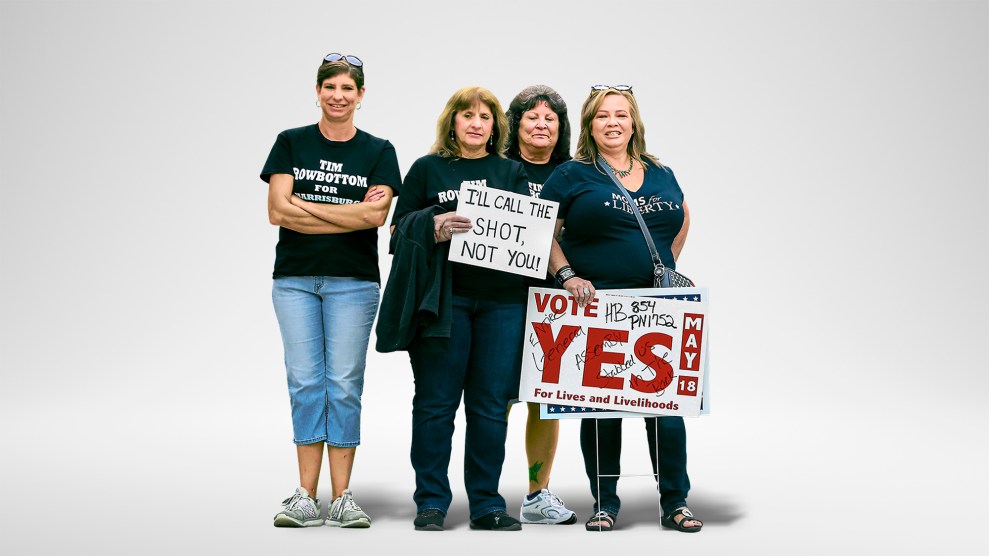
Mother Jones illustration; Getty
Senior Pastor Steve Riggle had some advice for the hundreds of young conservatives who had gathered at Grace Woodlands Church outside of Houston in September, as part of the fourth annual Texas Youth Summit: “You are the hope of the future of this nation,” he said. With “so much stuff going on that it’s not true,” their generation’s obligation was “to find the truth and stand with that.” Participants between the ages of 12 and 26 were granted free admission while their grown-up chaperones could purchase tickets that went for up to a few thousand dollars to listen to some versions of said truth from a who’s who of conservative luminaries, such as Texas Attorney General Ken Paxton, (who was indicted for felony securities fraud in 2015 and who recently attempted to avoid a subpoena), conservative commentator Candace Owens, Republican Rep. Matt Gaetz of Florida, (who had been investigated for alleged sex trafficking), Texas Sen. Ted Cruz, Rep. Lauren Boebert (R-Colo.), and Rep. Marjorie Taylor Greene (R-Ga.). The goal, as the website suggests, was to train a legion of students to promote Judeo-Christian principles and American Exceptionalism thus “empowering youth to be catalysts to win the Culture War.” If they showed up to vote and spread the message, the speakers promised that a “red wave” in the November elections was all but certain.
They may have their work cut out for them. Last spring, the Institute of Politics at Harvard Kennedy School released the results of a national poll showing that youth turnout is on track to match 2018 and that 55 percent of likely voters prefer that Democrats control Congress. Another survey conducted between July and August by NextGen with registered voters between the ages of 18 and 35 in seven states—Arizona, North Carolina, Nevada, Michigan, New Hampshire, Pennsylvania, and Wisconsin—suggests the Dobbs decision has animated young people, who are overwhelmingly against overturning Roe v. Wade, to vote in the midterms. In the 2020 presidential elections, the increasingly diverse group of young voters played a significant role in President Joe Biden’s victory.
“In my polling, it’s this age that we’re not doing well with,” Ken Paxton told the crowd. “And that means that you guys have to help us. We need you. You’re more important than your age suggests.”
The Summit’s creator, Christian Collins is carrying on a tradition started by activist Charlie Kirk and the founding in 2012 of Turning Point USA, the self-described “largest and fastest growing youth organization in America.” In July, Turning Point organized a Student Action Summit in Florida headlined by former President Donald Trump and, on October 16, the Young Latino Leadership Summit in Newport Beach, California. They’re not the only ones courting young conservatives through the conference circuit. Earlier this month, Rep. Dan Crenshaw hosted the third edition of a summit named after him in Houston aimed at the “teenager or young adult who is fired up for conservatism and protecting America’s future.”
In 2019, Collins, the child of missionaries, a self-described Christian nationalist, and a conservative activist who served as the campaign manager for Texas Rep. Kevin Brady and as an aide to Ted Cruz launched the Texas Youth Summit. Collins had an unsuccessful bid for Congress behind him and describes Ted Cruz’s father as his political mentor. This year his Summit had a vision and urgency similar to all the others before the midterms. “We have to save our country and the way that we do that is with the minds of our youth,” he said on a conservative podcast a few days before the event. In his introductory remarks to the audience, Collins previewed what was in store, including robust conspiracy theories—from the “Great Reset” plot, which boils down to global elites using Covid-19 to dismantle capitalism, to the Chinese Communist Party and Bill Gates buying American farmlands—and reliable culture war talking points on education, abortion, and immigration. If polling has led Democrats to imagine that the Supreme Court’s decision in Dobbs v. Jackson Women’s Health Organization curtailing abortion access might galvanize young voters, events like the Texas Youth Summit suggest Republicans want to make the culture wars their vehicle for mobilizing this demographic.
“I always heard that Roe v. Wade would never be overturned, but thanks to President Trump, the greatest president of our lifetime, and his three Supreme Court picks, it happened,” Collins said to a round of applause. “That should give you some encouragement.” The “Chinese Communist coronavirus,” he continued, helped boost homeschooling, and “patriots” should get involved on the local level by running for school boards and county commissioner seats. The point of the conference, which was sponsored by Patriot Mobile, a Texas-based Christian cellphone company that has been backing conservative candidates for school boards, Collins explained bluntly, was to teach the youth how to be the “right kind of Republican,” not RINOs—Republican in Name Only. Like the 9/11 first responders, they should “run to the fire” and fight on the cultural battlefield of college campuses. Throughout the event, the audience was repeatedly encouraged to attend trade schools instead of college, supposedly the ultimate domain of leftist indoctrination.
Later in the day, social media maven and Daily Wire host Candace Owens posed a question to the young crowd at Grace Woodlands Church, some of them wearing t-shirts with Ronald Reagan’s saying, “Freedom is never more than one generation away from extinction.” She asked, “Why do we offer commentary on culture?” before continuing, “It’s time for counter-culture, which is being Christian, having values, having decency, having morals, to respond and to recognize evil where it stands.” Evil, according to Owens, lies in “all the crazy things the left gets obsessed with” such as bathroom signs, gender identity, climate disaster, puberty blockers, and, of course, radical feminists. To the seemingly endless list of boogeymen, the following speaker, Rep. Marjorie Taylor Greene added companies implementing Environmental, Social, and Governance, or ESG, priorities, telling the audience that potential job applicants are rejected on the basis of their political beliefs and behavior online. “They’re tracking you,” she warned, before dumping on Air Canada’s electric planes and plant-based burgers, and attacking life-saving gender-affirming care as “medical experimentation.”
Sixteen-year-old Hannah Nehad is Muslim and an event coordinator with the Fort Bend County Young Republicans. She was backstage and had an interview with Greene where she asked the congresswoman what could be done about a church in Texas that hosted a drag queen event in September. Bringing drag queens into schools was inappropriate, Greene responded, “just like we wouldn’t bring a stripper in from a strip club.”
Late Friday evening, Sen. Ted Cruz took the stage to cheer Florida Gov. Ron DeSantis’ racist Martha’s Vineyard stunt and attack the “ever-loving hypocrite liberals.” In a rare display of self-awareness, Cruz also acknowledged that Republicans are “almost genetically incapable of communicating.” Instead of the old, bald, fat types who speak like accountants, he said, the party could use the young people before him. “Each of you has a platform,” he said, “each of you has a voice.” He then took the marketing opportunity to urge them to listen to his voice some more and subscribe to his podcast, Verdict With Ted Cruz. Donald Trump Jr. appeared via video to say the left has gone “so far and so ridiculous” before repeating the right’s most recent, preposterous gender identity trope that schools were putting out litter boxes for kids who identify as cats.
During the event, Collins tried to recruit participants to attend the next Texas Youth Summit focused on the border set to take place in South Texas a few weeks later, where a line-up of far-right Latinas calling themselves “triple threat” would appear. The group includes Mexican-born Mayra Flores, who in June won a special election and flipped a Rio Grande Valley congressional seat previously held by Democrats. Born in Tamaulipas, Mexico, to parents who were migrant farm workers, and now the wife of a border patrol agent, Flores took the mic to repeat her version of what everyone already had said was at stake this November. “Conservatives believe in personal responsibility; the left is pushing and believes in more big government dependency,” she said, before invoking the requisite talking points contrasting virtuous, Constitution-believing, border-securing, law-enforcement supporting, abortion-condemning conservatives with their murderous leftist counterparts.
But that strategy of relentlessly stoking culture wars could backfire. At the Crenshaw Youth Summit, which featured a panel titled “Taking on the Culture Wars” devoted to “calling out the woke nonsense that’s destroying society,” some young people expressed concern over Republican party infighting and indicated their views might be more moderate than those expressed by the middle-aged speakers. “Many attendees said…they’ve grown tired of the polarization and political bomb-throwing that have become the norm in American politics and that makes it difficult to find common ground on economic and social issues,” Robert Downen wrote in the Texas Tribune about the event. “Others said they feel somewhat politically homeless among their age cohort and thus are more willing to moderate their positions on issues such as immigration, abortion, and LGBTQ rights.” A recent LX News/More in Common/YouGov poll found that one-third of Republicans think the party needs more moderate candidates and a plurality of Millennials and Gen Z respondents agree.
“Youth who voted for Trump in 2020 were more likely to identify as moderate, and to care about climate change and racism, than older Trump voters,” Abby Kiesa, deputy director of Tufts University’s Center for Information and Research on Civic Learning and Engagement, wrote in an email. “However, they were slightly more likely to want to ban abortion than older Trump voters. Goes to show that you can’t generalize about youth, they have complex views on issues.” While most young people support abortion rights and perceive it as a salient issue that motivates them to vote, Kiesa said, “that motivation piece may include the not-insignificant minority of young people—19 percent—who said they felt ‘happy’ about the Roe decision.”
Still, 18 to 29-year-olds tend to be more liberal than their elders on almost every conceivable issue—LGBTQ rights, climate, abortion—says David Faris, associate professor of political science at Roosevelt University and author of The Kids Are All Left: How Young Voters Will Unite America. “Culture war issues are as likely as anything else to fire their base up,” he says, but deploying that strategy “to appeal to young voters, in general, is bizarre and counterproductive for Republicans.” These youth conferences, Faris explains, although aimed at shifting the new generation’s positions on social issues, “likely share the general MAGA outlook that characterizes national GOP politics.” In the long run, he thinks that the party “risks bleeding out a substantial number of young Republicans.”
Attacks on “wokeness” and extreme positions on wedge issues may have helped the GOP score victories in the primaries, but they could alienate the voters needed to win the general elections, says Samuel Abrams, who researches political behavior and participation as a senior fellow with the right-leaning American Enterprise Institute. Young voters have grown disaffected with both parties and the result “is a very energetic, very hungry group of people looking for something,” he says. Whichever party manages to seize this segment of the electorate, will likely have “lifelong voters and supporters.” The alternative? “A group that becomes disenfranchised for decades.”
















